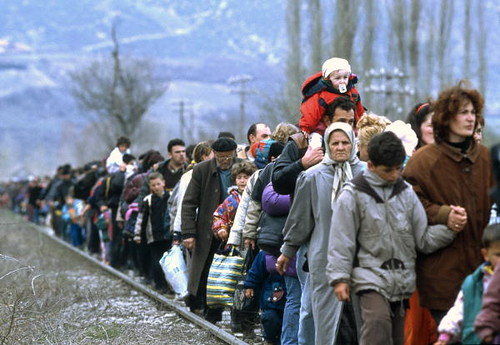Using migrants as weapons, the new inhuman fashion

Kosovo Refugees
In contemplating the global refugee crisis, one cannot ignore the stark reality that often, the decision to migrate is born out of sheer necessity rather than a desire for leisurely exploration. The notion that individuals willingly uproot their lives for the sheer fun of it is fundamentally flawed, requiring a closer examination of the complex circumstances that drive mass migrations.
Consider the hypothetical scenario: your country, once a haven of stability, is thrust into the throes of war. The city you call home becomes a battleground, and the air is thick with uncertainty. Alternatively, picture a region where the once pristine water sources are now undrinkable, rendering life unsustainable. Even more chilling, imagine a situation where dissenting voices are systematically silenced by the authorities, leading to arrests and persecution for those who dare to challenge the government’s narrative.
In the face of such dire circumstances, the idea of passively accepting imprisonment or choosing to succumb to peril becomes untenable. The instinct for survival takes precedence over any allegiance to one’s homeland. It is in these moments of crisis that the global community must confront the harsh reality that migration is often not a choice, but a response to untenable conditions.
However, the narrative takes a darker turn when examining the aftermath of mass migration. Once displaced, these individuals often find themselves unwitting hostages in the hands of criminals and bureaucratic machinery, both of which exploit their vulnerable state as pawns in geopolitical chess games.
In the complex web of international relations, displaced populations become tools for political maneuvering and negotiation. Criminal elements seize the opportunity to exploit the desperation of refugees, subjecting them to various forms of exploitation, human trafficking, and illicit activities. Simultaneously, bureaucratic systems, often ill-equipped to handle the scale and urgency of the crisis, contribute to the perpetuation of suffering as individuals navigate cumbersome processes and legal hurdles.
Let’s give some exemples of using migrants as weapons, the new inhuman fashion.
For exemple in March 2016, as BBC and other big newspapers reported that Turkey and the EU reached an agreement in which Turkey agreed to take back migrants and refugees who crossed into Greece in exchange for financial aid, visa liberalization for Turkish citizens, and progress in EU accession talks for Turkey. However, there were moments when Erdogan suggested that Turkey might reconsider its commitment if the EU did not fulfill its promises.
In 2021, despite Morocco received financial aid to limit illegal migration, 8000 migrants arrived to Ceuta, that is a Spanish enclave, so European territory.
(Why is it still permissible for countries to maintain enclaves worldwide and control the most valuable portions of others’ lands? This raises valid arguments that warrant consideration, but will won’t talk about that here.)
In that case, Spain leveled accusations against Morocco, alleging a relaxation of border control.
There are a lot migrant influxes in the world ongoing, here some of them :
Syrian Refugee Crisis
Venezuelan Migration Crisis
Rohingya Crisis
Central American Migration to the U.S.
Mediterranean Sea Crossings
Ukranian toward eastern Europe
Human tracking and migrant transit hub in Lybia
So, everyone of this crisis can have different causes, but the complex interplay of these factors underscores the desperate circumstances that drive people to undertake dangerous journeys in the pursuit of a better life.
Governments often seem to treat the lives of migrants as if they hold little value, allowing tragedies to unfold in the Mediterranean Sea or in refugee camps, without addressing the root causes of the issue. There appears to be a lack of concerted efforts to develop comprehensive solutions that would effectively tackle the underlying problems driving people to undertake perilous journeys and seek refuge.
Fortunately, there are organisation as OXFAM, Amnesty and hundreds of other, try to help when governments look the other way.
But we have the power to change governments and push our ideas as a group of citizens.
Let’s fight for a better world, not just for our neighborhood.




